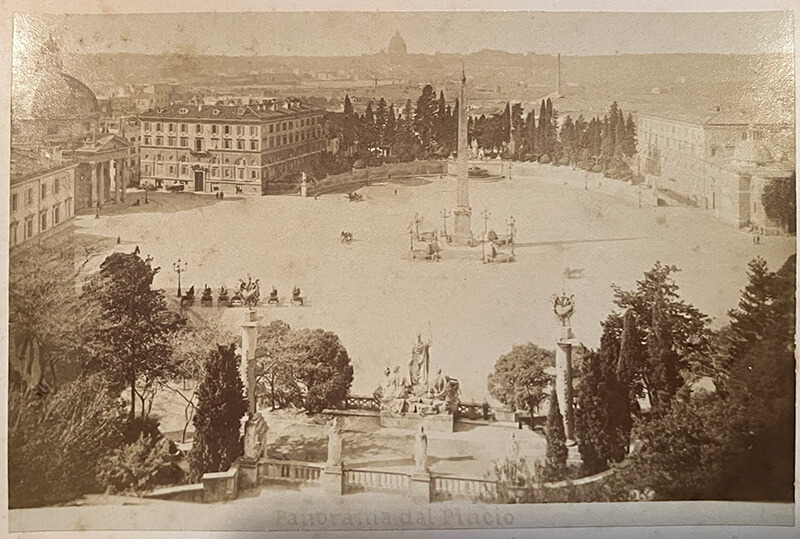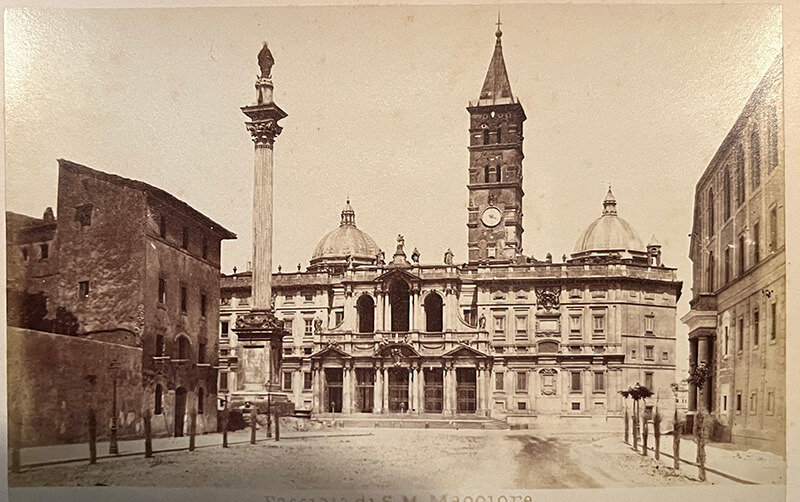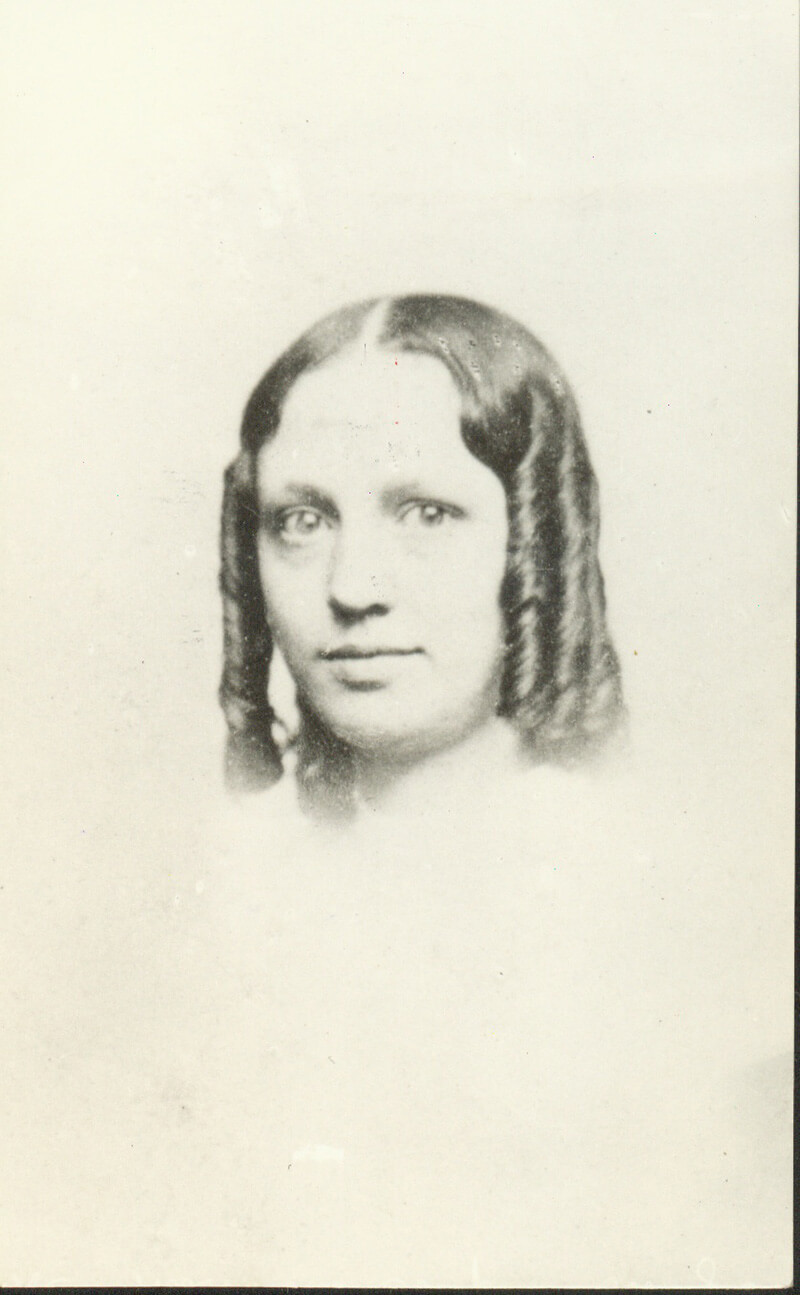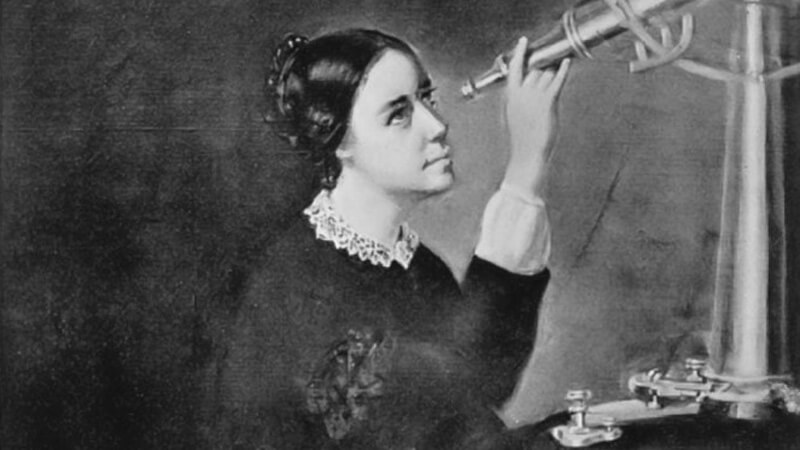Antiochiana – Songs from the Stacks
Ada Shepard to Mary Richardson 7 Feb 1858
Commemorating Women’s History Month, Stacks draws from one of the few manuscript collections Antiochiana had ever purchased from a dealer, the Mary Richardson Letters. Mary’s college roommate was a member of Antioch College’s first ever graduating class (1857), Ada Shepard, and the greatest bulk of letters in the collection are between the two of them. Richardson graduated two years after Ada, married classmate Harrison Keith, and the two became teachers in Quincy, Massachusetts. The Richardson letters have been endlessly useful ever since, and were regularly assigned in the course “Women’s Letters and Diaries” developed by former Professor of Literature Marianne Whelchel.

Ada became a teacher herself, and was for a few years an instructor in languages at her alma mater, along with the man she married in 1862, fellow 1857 graduate Henry Clay Badger, known as Clay. She hailed from Dorchester, Massachusetts, and from the time she arrived in Yellow Springs, Horace and Mary Mann took a particularly keen interest in her welfare. Such was their regard for her that following graduation they got her a job as governess for the children of Mary’s brother in law, the author Nathaniel Hawthorne. Ada accompanied the Hawthornes to Europe as Nathaniel had received a diplomatic appointment as US consul to England from his old schoolmate from Bowdoin College, President Franklin Pierce, for whom he had recently written a stirring if not entirely factual campaign biography.
The Hawthornes traveled extensively during Nathaniel’s term at the Consulate, and Ada’s letter provides an excellent account of what they saw on their journey from England to Rome. From their home in Leamington Spa, Warwickshire, to Folkestone on the Channel coast, today the UK entrance to the “Chunnel,” they headed for Paris, where she visits several sites familiar to modern tourists such as the Louvre at a time when the memory of Napoleon Bonaparte, one of the most prolific contributors to its collections (largely through conquest), was prominently on display. Though dead nearly forty years at that point, Napoleon still looms large in the Paris of 1858, his much talked about tomb still four years away from completion. Ada and the Hawthornes are accompanied on this journey by Maria Mitchell, a pioneering astronomer and considered the first woman to gaze at the stars professionally.

Ada repeatedly expresses how much she misses her many friends from school, mentioning a number of Antioch notables in the process: both the Brown sisters, Oella and Olympia, come up, the latter most famous as the earliest woman in US history to be ordained a minister. The Mrs. Dean that she asks about is better known to history as Rebecca Pennell, considered the first woman college professor in American history to have equal status to her male colleagues. While no fewer than five Mr. Burkholders are found in the early College rolls, one died a hero in the Civil War and the local chapter of the Grand Army of the Republic, a veteran’s organization, was named in his honor.
The letter concludes with Ada’s plea for news of the College, which at that time was tearing itself apart in a sectarian dispute between people representing the founding denomination (referred to by her as the “Christians”) and the liberal educators on the faculty and supporters of Mann from the east, most of whom were Unitarians.

Rome, Feb, 7th 1858
Dear, dear Mary,
Do you think that I have quite forgotten my indebtedness to you for a letter? Do you imagine I have never received yours of Thanksgiving Day? Do you think I am impardonable neglectful? I would I could look straight into your heart Sunday evening, and see what kind of feeling exists toward your friend Ada. I feel almost as if I could hardly be pardoned for having stayed in Rome a fortnight without writing to you but that is the “head and front of my offending”, for I did not receive your letter until I arrived here. Since then I have been busy all the time, and have hardly been able to write a decent letter home; but every day I have thought: “I will write to Mary and Miss Churchill”. Still I kept delaying until I could find time to write long letters worth sending all the way from Rome to Yellow Springs, and so it hasn’t been done yet. To-night, however I determined to commence at last.
Just think of my having been deprived of letters for nearly three months! I asked everybody to direct to Rome, when I went to Leamington, as the Hawthornes then thought we should be there in five or six weeks; but we were detained in England until the fourth of January, and did not reach Rome until the evening of the twentieth.
All the time I was in agony about my letters, not knowing whether my friends were dead or alive, happy or miserable. And yet—I could not send for my letters without incurring the risk of losing them, because we were constantly expecting to go and constantly detained by a series of calamities that would take a long time to describe.
At last, however we reached the promised land and I found a huge bundle of letters which it actually took me a whole day to read. All the news was good, too, which I had not dared to hope before I found them. I hope, whatever may hereafter befall me, that I shall never be utterly cut-off from communication with my friends, for nearly three months again.
I shall never forget the suffering I endured in London on that account. But now it is all over and I am grateful for the relief and joy afforded me by those precious letters. Your little one written on Thanksgiving day was read with delight. I had been longing to hear from you, and now I am still more anxious for another letter. I wonder if I shall have to wait six weeks or more for an answer to this! It takes a very long time for letters to go from Rome to Boston, even, and between here and Yellow Springs I fear it will take nearly a month! Do write as soon as you receive it, dear Mary, and tell me everything about your precious self and about the affairs of the college. The last news I had from here seemed very alarming. I should think that “marrying and giving in marriage” had become the order of the day there. Clay writes me that he hears from Mr. Burkholder of the marriage of Mr. Clark and Miss McDonald. Pray, can it be true? And he heard, too that Mr. W. Hill was married and had left school and that Mr. Schuyler and Oella Brown would soon marry. What a chapter of marriages! It will be really unfortunate for the college; will it not?

I was quite amazed and not a little amused at your seriously written account of your intimacy with Bruce Moffat. Does it continue? I believe that Joseph Moffat was always quite an admirer and friend of yours, but I didn’t think so of Bruce.
As I said we have been in Rome more than a fortnight. We started from London on the fourth of January and went to Folkstone by railroad. Thence we crossed the Channel to Boulogne and went directly to Amiens, where we stopped for the night. The next morning we went to see the famous Cathedral Amiens and then went on our way, and arrived at Paris that night. We stayed here a week; at the splendid Hotel du Louve, where Mrs. Dean stayed when she was in Paris.
I enjoyed this week very much and called to see my good Paris friends, the McDaniels and M. Fezandie, of whom I wrote to you when I was first in Paris, I think we visited the Louvre, the most splendid palace in Europe as I have heard travellers say, the Cathedral of Notre Dame, the Church of the Madeleine and the Hotel des Invalides where is Napoleon’s Tomb. The church and dome in which is the splendid sarcophagus that is to contain I his ashes (for it is not yet finished) is the most magnificent structure of the kind that I ever saw, and certainly it was the most interesting place to visit. The ashes of the Emperor at present—lie in a black marble coffin (I think it is black marble) within a chapel in this church, Upon the coffin is hung a black pall, and near it are placed one of the Emperor’s swords and his hat. We saw many relics of him in the palace of the Louvre. There is one entire room devoted to memorials of his and the imperial N and his favorite emblem, the bee, are embroidered on the hangings of the room, while the words “Patrie” and “Honneur” stand in gold letters in the corners of the ceiling. His books, his swords, his hats, his old grey coat, his breakfast service, etc, etc, are preserved and exhibited here. It struck me most painfully that there was not a single memorial to Josephine in the whole room. There was a bust of the little King of Rome, and a few of his garments and even his playthings were shown here but not a single thing belonging to the Empress Josephine and, if I remember, nothing of Marie Louise.
But I don’t know why I am telling you all about Napoleon, I merely meant to give you a little account of our journey here. We left Paris on the thirteenth and rode to Lyons the first night going thence to Marseilles, we actually suffered; and, indeed, since I have been in Rome, dear Mary, I have been more uncomfortable from the cold than even in our little corner room, than ever in my life before. Such cold weather was never known in Rome, before; or, at least not for many years, according to the “oldest inhabitants” here. Isn’t the world undergoing a revolution in climate? I hear that it has been astonishingly warm in America this winter.
We stopped at Marseilles two days, and here we had two pleasant experiences not withstanding the filthy and disagreeable aspect of the city generally. One of these was that we got thoroughly warm and the other that we had the most delightful view of the Mediterranean Sea, which is more beautiful than even I had imagined it, dear Mary.
How I wish you could have been with me during our passage from Marseilles to Civitavecchia. We took places in the pretty little Neopolitan steamer Calabrese, which stopped a day at Genoa and half a day at Leghorn, so that we had time to see the city of Columbus. Genoa la Superba it may as well be called. We went all over the most magnificent palaces and churches, and my childish dreams of the possible splendor of such structures were more than realized. I was really quite worn out at night—with the mental exertion that is required to comprehend so much magnificence, Miss Mitchell said that if we should any of us die in consequence of that visit, the verdict would have to be “died of marble places”. But I believe I have not told you that Miss Mitchell, the Astronomer, is here in Rome, near us and that she came with us all the way from Paris. You remember that I tried to make an arrangement to come with her last summer. I have seen a great deal of her and am charmed with her. She is a strong, earnest woman and an honor to our sex. She is staying here quite alone, in a nice little suite of apartments. Una and I go to see her often and she frequently joins us in walks which we take from one to three every day.
But all this is a digression, which you will laugh at, remembering my old habits.
We stayed but a short time at Leghorn and entered more of the palaces, but visited a Jewish synagogue and a Cathedral; also a cemetery in which [Scottish poet Tobias] Smollett is buried.
I wish I could give you any idea of the loveliness of the scenery during our passage, for we did not lose sight of land at all, but coasted along the shores of southern France and northern Italy. We passed the island of Elba, among other islands, and you can imagine with what emotions I gazed upon the spot where Napoleon passed his first days of exile. Unfortunately we did not go near enough to see what its appearance is. We only saw that its outlines are very rugged. Arriving at Civitavecchia, we had to take a private carriage to come to Rome, for the diligences were all full and there is no railroad. They are building one now, and have been for ten years, I hear. I wonder when it will be finished at this rate. The distance is between thirty and forty miles, only. It is the most stupid ride imaginable, or, at least, all the road over which we passed in the day-time is so. For the last third of the ride night enveloped us. The country looked more like Cape Cod than any other place I know and Miss Mitchell said she thought it looked precisely like Nantucket. So we tried to fancy ourselves in New England.
I shall sometime give you a description of this ride to Rome, so many funny things occured; but I shall have to wait until I see you, I think. I long for that time, meanwhile I thirst for letters from you. Do write as soon as you can to your loving friend Ada.
Please give my love to Rebecca Rice and remind her that she owes me a letter. Give much love, too, to Maria Speer. Is Miss Fisher at Yellow Springs? If so, please remember me kindly to her. I shall try to write to Olympia Brown; but if I do not, I would like to send my love to her, through you. I long to hear all about our society. Have you had any public meetings this year?
I am sorry that I have no more to tell you anything about what I am seeing and doing in Rome; but I will try and tell Miss Churchill a little about my life here, and I must refer you to her letter. I take the liberty of making several enclosures in this letter trusting to your kindness to deliver them.
What fierce contests have been going on between the Christians and Mr. Mann’s friends [page torn] year! Clay has sent me accounts of them. I long to know what are the prospects of the institution [page torn] another year. Please give my love to Mrs. Mann and Mrs. Dean if you find it convenient.
